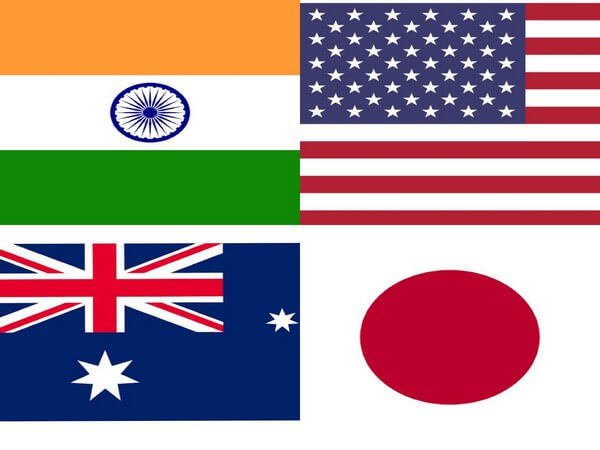
Quad as Bulwark Against an Aggressive Dragon

There is heightened expectation as US President, Joe Biden is preparing to host the first, ‘in person’ Quad leaders’ summit, on 24th September 2021 at White House. Besides host USA, others, Indian PM, Narendra Modi, Scott Morrison, Australian PM and Yoshihide Suga, Japanese PM have confirmed their participation. The hype and hope are driven by desire to craft coping strategy to deal with aggressive China and other challenges, like COVID pandemic and climate change.
Two side-show events, in the run up to summit have thrown up relevant posers. The first one was announcement of creation of AUKUS, grouping of Australia, UK and USA, with agreement to produce eight nuclear powered submarines for Australia. Peeved by jettisoning of $90 bn deal, France has recalled her ambassadors from USA and Australia. France and Australia had been working on this deal and both sides had even made commitments including financial guarantees.
The second, though minor one was abrupt recall of New Zealand cricket team from Pakistan, reportedly on intelligence inputs provided by I-5, an intelligence sharing network with USA, UK, Canada, Australia and New Zealand as partners. This brings to fore the ever ubiquitous questions. Is Quad, mere talking shop? Will USA create more specific, functional and focused platforms like AUKUS and I-5 to operationalize its Indo-Pacific agenda to check China?
This discussion excludes ‘Central Asian Quad’ comprising USA, Uzbekistan, Pakistan and Afghanistan to promote connectivities in Central Asia as part of Build Back Better World (B3W). Sudden power grab by Taliban has rendered this intended counter to BRI in Central Asia, non-starter for the time being at least. But it does reinforce the trend of creating more such groupings.
Summit and Agenda
The planned meeting comes as a follow-up to first ever leaders meeting, albeit in ‘virtual mode’ on 12 March, earlier this year. Quick follow-up and up-gradation of contact has been catalyzed by unabated threats emerging in South and East China Sea and littorals, most notably Taiwan, Philippines and Vietnam, despite naval deployments and exercises including recent one near Guam.
China naturally is peeved, bit nervous and describes Quad as Asian NATO. Every such round of deliberations is accompanied by Chinese venting criticism and anxiety. To counter predictable diatribe emanating from Beijing, official agenda for proposed summit outlines that focus will be on deepening ties and co-operation on COVID-19, climate change, cyberspace, emerging technologies and promoting free and open Indo-Pacific. A review of QUAD Vaccine initiative unveiled in virtual summit is planned as prelude to wider discussion in UN.
The summit will give an opportunity for leaders including PM Modi to travel and participate in UN General Assembly session. This would be the first visit abroad for PM Modi, six months after a short Dacca visit. India facing multiple challenges of pandemic, Chinese aggression in Ladakh and imbroglio in Af-Pak, consequent to US withdrawal, will get an opportunity to deliberate and improve multi-lateral co-operation.
Creation of other groupings puts increased pressure on India to take an unequivocal call on balancing and strategic autonomy vis a vis more coherent and purposeful alliance with Quad like AUKUS. A new tri lateral coupled with existing Indo-Japan bilateral leaves, India on margins. Similarly, EU is also under pressure on this issue as switch in submarine deal is being ascribed to French hesitancy on account of balancing with China.
QSD-Genesis
Quadrilateral Security Dialogue (QSD) is forum of USA, Japan, India and Australia to deliberate and co-operate on strategic issues. It was initiated in 2007 by Shinzo Abe, Japanese PM as part of vision to establish Asian Arc of Democracy. The forum is in sync with American endeavors for Pivot or Rebalancing to Pacific, now repackaged as Indo-Pacific. Some critics opine that US would like to remain relevant in Asian or Chinese century and sees maritime empowerment as an opportunity for its military industrial complex like the latest switch of submarine deal with Australia.
Quad and QSD slipped into limbo forced by ambivalent attitude of Australia under Kevin Rudd from 2008 to 2010. Dependence on Chinese supply chains have acted as restraining check, wherein India and even Japan (under PM Taro Aso in 2008-09) tried to downplay Beijing’s narrative- ‘Quad being designed for containing or encircling China’. Chronologically, after initial and hesitant start in 2007, group was in recession mode from 2008 to 2016. India was still hedging, hoping for accommodation by Xi. Accordingly, PM Modi articulated its ‘balancing approach’ as part of inclusive Indo-Pacific in Shangri-la dialogue in 2018.
QSD, itself was preceded by Tri-lateral Security Dialogue (TSD) between USA, Japan and Australia. India on its part hosted and participated in bilateral and multi-lateral maritime exercises like Malabar and seminars to promote concept of free and open Indo-Pacific. Disaster Management, anti-piracy were other focal areas. Tsunami in 2004 provided impetus to formation of Quad. Chinese aggressive moves in Doklam and Ladakh have forced a reappraisal and there is increased traction on utilizing Quad as a tool of deterrence. Objective analysis would indicate that coalescing of alliances, which China views as targeting her are primarily due to aggressive and unreasonable behavior on her part.
Like other regional formulations with observers and dialogue partners, Quad maritime exercises like Malabar have had large number of observers. In the last dialogue, forum was made more inclusive in its redefined avatar of Quad Plus in March 2020 by incorporating New Zealand, South Korea and Vietnam as dialogue partners. India’s immediate neighbors, Sri Lanka, Bangladesh, BIMSTEC and ASEAN nations are cautious, weighed down by dependence and trade ties with Dragon, despite being at receiving end of unfair forays.
Macro Challenges in Indo-Pacific
The new great game unfolding in Indo-Pacific is complex interplay between Chinese Maritime Silk Road (dubbed as String of Pearls) and democratic coalition lead by USA wanting to retain leverage. This has manifested in Chinese forays in Djibouti, Gwadar, Hambantota, Kayakpyu and Kra canal to lessen its Malacca dilemma and build redundancies for energy corridors. As a corollary, Japan discarding its insular and pacifist approach embarked on acquiring Djibouti as a base.
China has also embarked on reef grabbing and island building spree in South China Sea. It propagated ‘11 Dashes’ line, reduced to ‘9 Dashes’ and now with 10th one added to include Taiwan. These unilateral promulgations are part of lawfare and cartographic manipulation. Compounding the matters is continued defiance by China in disregarding award of arbitration tribunal constituted under UNCLOS. The recent maritime laws promulgated by China have potential of becoming another irritant as they limit rights of free passage.
India has been an early proponent of free and open Indian ocean and Indo-Pacific with initiatives like Indian Ocean Naval Symposium, IOR Rim Association, multi lateral exercises/ deployments and coordinated anti-piracy patrols. Different littorals have their own conception of very term Indo-Pacific. USA with two different commands, Indo-Pacific and Central has bifurcated its coverage. India and Japan have relative congruence with physical realm covering western coast of Africa to Pacific. However, both are more centred on their immediate proximate areas. Australia naturally maintains enhanced Pacific centric focus. India is working to build shared facilities to ensure better surveillance and response.
It will be appropriate to mention that Indian initiative of Information Fusion Centre- IOR has been subscribed by 29 countries. It is a major step forward in Security and Growth for All in the Region (SAGAR). The challenges in Indo-Pacific though formidable can be resolved with co-operation, respect for law of commons and rights of free passage.
Way Forward
India has reasonable expectations from upcoming Quad summit for enhancing co-operation to tackle an aggressive China, increased threat of terrorism and ongoing pandemic. Notwithstanding optimism, continued dependencies on China, dictate pragmatic approach and even limit options. Considerations of maintaining strategic ties with USSR, Iran and France (now unfavorably disposed to Quad) and economic down turn add to complexities.
It will require dynamic, deft and nuanced diplomacy, to balance pull of Quad (going whole hog) with need for strategic autonomy and retaining balance. In many ways, it is indeed mythological ‘Trishanku’ moment denoting complicated trilemma between interests (ends), resources (means) and linkages (ways).
**********************
Disclaimer
The opinions expressed in this article are the author’s own and do not reflect the views of Chanakya Forum. All information provided in this article including timeliness, completeness, accuracy, suitability or validity of information referenced therein, is the sole responsibility of the author. www.chanakyaforum.com does not assume any responsibility for the same.
Chanakya Forum is now on . Click here to join our channel (@ChanakyaForum) and stay updated with the latest headlines and articles.
Important
We work round the clock to bring you the finest articles and updates from around the world. There is a team that works tirelessly to ensure that you have a seamless reading experience. But all this costs money. Please support us so that we keep doing what we do best. Happy Reading
Support Us





















POST COMMENTS (1)
VS